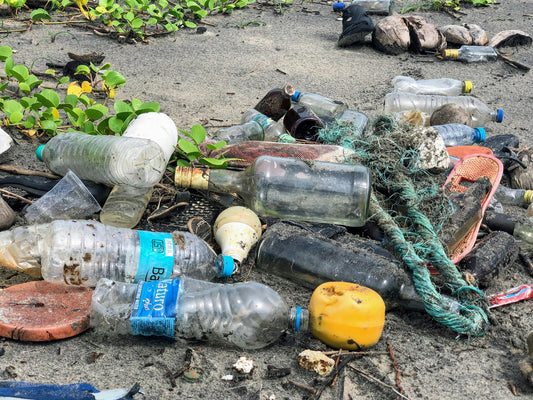Share
The Environmental Challenge
In today's world, our environmental impact on the planet is more prevalent than ever before. With growing awareness about global warming and the impact of plastic pollution, consumer are increasingly looking for alternatives to plastic.
Bamboo has emerged as a promising eco-friendly alternative to plastic for many products.
In this article, we'll explore Bamboo as a material and answer the question: Is bamboo better than plastic?
The Rise of Bamboo
Bamboo has been around for quite a while. The earliest traces of people planting and using bamboo date back to more than 7,000 years ago. Back then it was already used for many things from food, clothing, and housing, to even music instruments and weapons. From that you can already tell that bamboo has many applications, but let's summarize, why bamboo makes a great material.
Beautifully crafted items like this bamboo soap dish show, why bamboo gained so much popularity over the past few years.
1. Bamboo is a true jack of all trades

Its material properties make bamboo one of the most versatile materials in the world.
- it can be used for hardwood products such as flooring, tools, or furniture
- its fibers can be woven into a durable and soft fabric that can be used for anything around clothes, sheets, or towels
- bamboo can even serve as food source by eating bamboo shoots or brewing beverages (e.g., tea, wine, beer)
2. Bamboo is super renewable

Bamboo is one of the fastest growing materials on the planet.
It can grow up to three feet in a single day. You can literally wait in front of a bamboo plant and watch it grow!
When bamboo is harvested, it is usually cut above the root. The plant itself stays intact and continues to grow. This is a great advantage to lumber, as trees are not able to grow back after being cut.
This makes bamboo a great renewable resource compared to other trees or plants that take a lot longer to grow.
3. Bamboo is biodegradable
If you know us, you know that we hate plastic pollution.
As a natural material, bamboo does not cause pollution, as it biodegrades naturally.
A bamboo toothbrush for example returns to soil in a few months, while a plastic toothbrush takes 400 years to decompose.
Additionally, the plastic toothbrush will never fully biodegrade, but rather turn to microplastic that harms the environment and yourself.
4. Bamboo has a low carbon footprint
Bamboo has the potential to be a carbon super hero.
Not only does it absorb almost four times as much as trees - on average a hectare of bamboo can absorb 17 tonnes of carbon dioxide per year.
Bamboo also acts as a carbon sink, which means that bamboo groves and the end products help to sustainably store carbon dioxide from the atmosphere.
In addition to absorbing more carbon from the atmosphere Bamboo also creates 30% more oxygen than other plants,
This makes bamboo a valuable material for combating climate change.
5. Bamboo is naturally antibacterial

The bamboo tree contains anti-bacterial substances in the trunk, which it uses in order to protect itself against insects, fungi, and bacteria.
This not only means that bamboo can be grown without the use of pesticides, but whatever is produced from bamboo contains these antibacterial characteristics as well.
You can imagine this anti-bacterial super power comes in handy when you think of kitchen products such as kitchen brushes, which are exposed to humidity and bacteria.
6. Bamboo is very durable and water resistant

If properly taken care of, bamboo items are super durable. Further, as it grows in humid areas, bamboo is naturally water repellent, which increases its durability even more.
After all, people have been using it for different applications for millennia.
Only recently, Chinese researchers uncovered ancient bamboo relicts that are believed to be 2000 years old.
7. Bamboo is cost-efficient
Because of its rapid growth and easy cultivation, bamboo is comparably cheaper than other natural materials like wood.
Especially in its competition against the environmentally harmful plastic, this is an important trait on bamboo's way to conquer the market.
8. Look and feel
While this is definitely a subjective argument, many people like bamboo for its aesthetics.
The high-quality look an feel of bamboo products is similar to wood and they make a great addition to any household.
Additionally, bamboo is dense, but lightweight, which are great traits for any of its applications.
9. Heat resistance
Bamboo is relatively heat resistant, as it can handle temperatures up to 400°C (750°F).
This is more than enough for a majority of uses in the overall household and kitchen.
Bamboo vs. Plastic: The Showdown

Environment: Bamboo's first punch is almost a knock-out! Bamboo is a fantastic eco-friendly material. It can act as a carbon sink, grows naturally, and needs little energy to grow. Finally, bamboo is 100% biodegradable. Plastic on the other hand never biodegrades and has a terrible impact on the environment. It instead breaks down into microplastics. As if that weren't enough, plastic production uses many chemicals and crude oil and emits a significant amount of carbon.
If you're interested in a more detailed breakdown of plastic production and its environmental impacts, check out our dirty truth series about plastic bottles, bags, and straws.
THE WINNER: BAMBOO
Material: Comparing plastic and bamboo, it becomes evident that bamboo shares some of the traits that contributed to the rapid success of plastic. Bamboo versatile, durable, and lightweight. While bamboo can be processed into many products and forms, it is not as incredibly versatile as plastic, which can be molded into virtually anything. But with its heat resistance, bamboo gets the draw for our material show down.
THE WINNER: IT'S A DRAW
Cost and availability: One of the main reasons behind plastic's success is its low cost. While bamboo is relatively cheap compared to other natural materials, it cannot beat plastic in this category. Additionally, bamboo is still not as widely available as plastic, which means we need to give this point to plastic. It is a very close call though, because bamboo's durability often outweighs an initially higher cost and more and more products are available.
THE WINNER: PLASTIC
Health: Here comes the right hook that knocks plastic out of its socks. As a natural material, naturally produced bamboo is safe to use for the whole family. Plastic on the other hand can be linked to many health conditions, as it emits chemicals and microplastics. Cancer, lung problems, and even changes in hormone production have been linked to plastic. There is no doubt that this final point goes to bamboo.
THE WINNER: BAMBOO
Conclusion
The battle between plastic and bamboo is not an all-or-nothing deal. Both materials have their advantages and depending on the use, you may prefer one or the other.
In the showdown, bamboo could convince with its eco-friendly properties and low impact on the environment and health, while plastic is still less costly and more widely available.
In the context of our current environmental crisis, bamboo emerges as the clear winner for a more sustainable future. Its versatility, renewability, low carbon footprint, and biodegradability make it a great alternative to plastic, especially for throwaway items like utensils, straws, or packaging.
While the adoption of bamboo is growing, it's essential that consumers and businesses continue to explore this great material for eco-friendly alternatives.
In the fight against plastic pollution, bamboo for sure packs a punch!
We hope you enjoyed this article. If you want to read more like this, make sure to check out our Blog and follow us on Instagram. If you are interested in truly sustainable products, check out our Shop.
If you want to engage in the discussion, feel free to leave a comment below.

![Is Bamboo Better Than Plastic? The Showdown [2024] - SWOP - shop without plastic](http://www.shop-without-plastic.com/cdn/shop/articles/boxing-gloves.jpg?v=1716979130&width=1500)







1 comment
let all of us know its all about the money. we as a country have sold our selves to the devil and trump and biden are two of the worst. this so called president should have been impeached long ago.he has given our country to china in so many ways. plus free passes to all who want to come over our boarders very little to stop them. we our decaying with in look at this so called president not him or low life hunter going to honer the vets today i am one at 80 how sad for all america, we are the divided america not the united america i grew up with the 1950 decade. thank you to all of us vets.